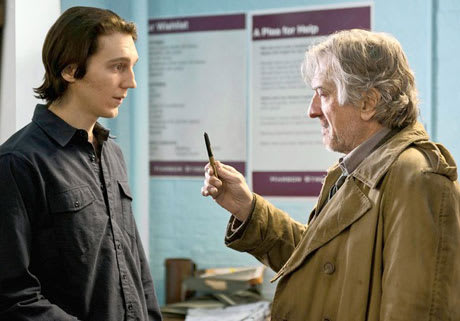Dismissing Paul Weitz's adaptation of the Nick Flynn memoir, Another Bullshit Night in Suck City, as maudlin indie art fare would be easy enough, seeing as it wears its sentiments on its sleeve and adopts a stylistically risky narrative approach to compress the more colourful elements of the source material. What's more is that the pedagogical framework forces identification by doting on the ease in which one can rapidly descend into homelessness, focusing on the isolation of it all in a bid to preach the importance of helping our fellow man in need.
Fortunately, this guiding ethos is propelled by the sincere central story of author Nick Flynn's (Paul Dano) youthful concerns of following in the footsteps of his drunken, absent father, Jonathan (Robert de Niro), whose assertion that he's America's greatest undiscovered writer mirrors Nick's seemingly fruitless ambitions.
This dormant anxiety comes to a head via joint voiceover narration ― although the voice suggests that Jonathan's narration is a projection and construct of the real author, Nick ― as our unemployed protagonist takes a job in a homeless shelter working with his pixie-haired love interest (Olivia Thirlby), only to run into his racist, rambling father in a discomforting capacity.
Through a series of flashbacks and ghostly observations of an un-filmed future ― Lili Taylor's character is introduced as a reformed drug addict and prostitute that will eventually revert to old habits and kill herself ― the story is one of artful stylization, working as a hypnotic and self-conscious work where symbolism is meant to fill in any narrative blanks. Characters occasionally acknowledge the audience and entire life events, and feelings are represented by emotionally wrenching sequences, such as one where the camera pans back and forth on Nick and his parade of temporary father figures throughout his childhood.
And while these deliberately lyrical moments of humanity give the audience enough respect to fill in the blanks themselves, they could be criticized for glossing over complicated issues without due explanation. This perspective is valid, but the tone and structure of the film are far too deliberate to dismiss what Weitz attempted to do by leaving secondary characters like Nick's overworked, self-destructive mother (Julianne Moore) to exist as spiritual overseer and moral centre, as perceived by our central character. This world is one of subjectivity, existing within the ambivalence and confusion of the protagonist.
Choosing to ignore some of the occasional heavy-handed imagery made potent by Badly Drawn Boy's touching string score, the central observations about self-blame and personal reticence are quite profound and deeply moving, as is the practical message of being rational about ambitions and dreams. Unfortunately, no matter how special we think we might be, not everyone can be the next Mark Twain or J.D. Salinger, which, for some, is as devastating as mortal awareness.
(Alliance)Fortunately, this guiding ethos is propelled by the sincere central story of author Nick Flynn's (Paul Dano) youthful concerns of following in the footsteps of his drunken, absent father, Jonathan (Robert de Niro), whose assertion that he's America's greatest undiscovered writer mirrors Nick's seemingly fruitless ambitions.
This dormant anxiety comes to a head via joint voiceover narration ― although the voice suggests that Jonathan's narration is a projection and construct of the real author, Nick ― as our unemployed protagonist takes a job in a homeless shelter working with his pixie-haired love interest (Olivia Thirlby), only to run into his racist, rambling father in a discomforting capacity.
Through a series of flashbacks and ghostly observations of an un-filmed future ― Lili Taylor's character is introduced as a reformed drug addict and prostitute that will eventually revert to old habits and kill herself ― the story is one of artful stylization, working as a hypnotic and self-conscious work where symbolism is meant to fill in any narrative blanks. Characters occasionally acknowledge the audience and entire life events, and feelings are represented by emotionally wrenching sequences, such as one where the camera pans back and forth on Nick and his parade of temporary father figures throughout his childhood.
And while these deliberately lyrical moments of humanity give the audience enough respect to fill in the blanks themselves, they could be criticized for glossing over complicated issues without due explanation. This perspective is valid, but the tone and structure of the film are far too deliberate to dismiss what Weitz attempted to do by leaving secondary characters like Nick's overworked, self-destructive mother (Julianne Moore) to exist as spiritual overseer and moral centre, as perceived by our central character. This world is one of subjectivity, existing within the ambivalence and confusion of the protagonist.
Choosing to ignore some of the occasional heavy-handed imagery made potent by Badly Drawn Boy's touching string score, the central observations about self-blame and personal reticence are quite profound and deeply moving, as is the practical message of being rational about ambitions and dreams. Unfortunately, no matter how special we think we might be, not everyone can be the next Mark Twain or J.D. Salinger, which, for some, is as devastating as mortal awareness.
